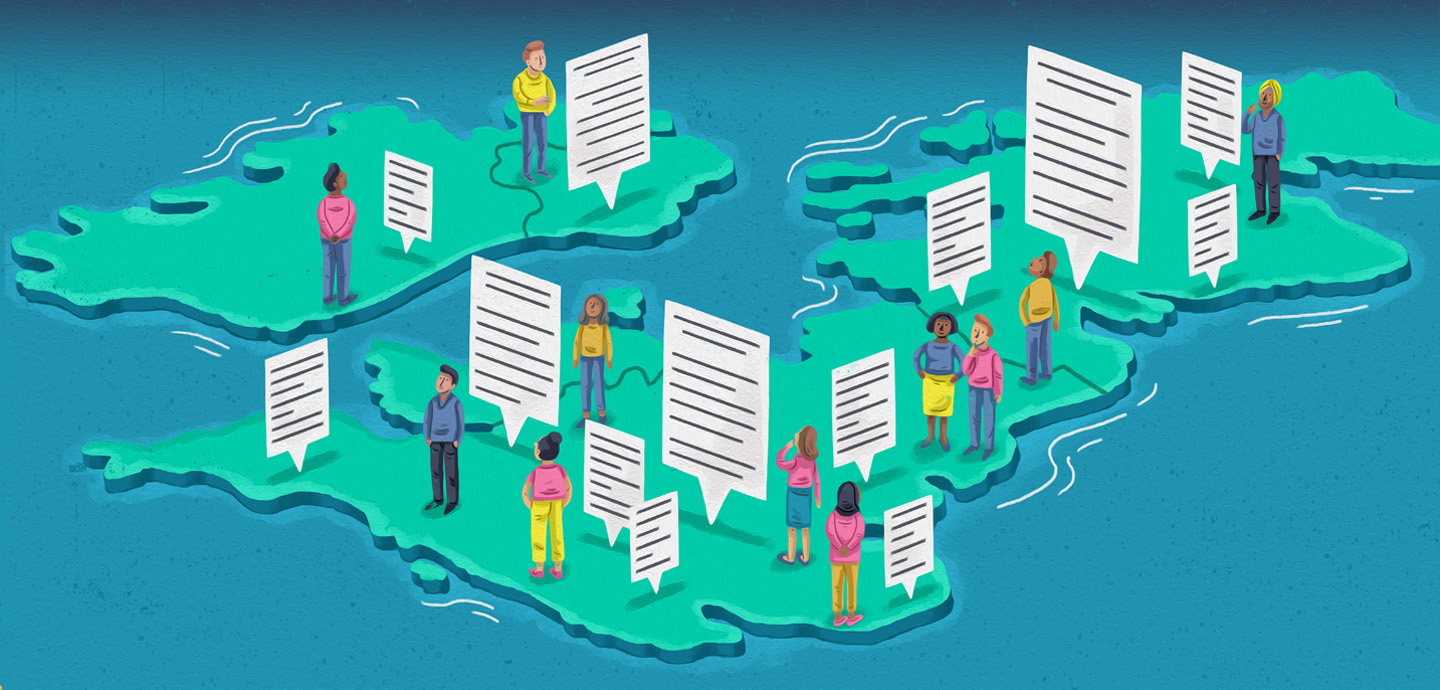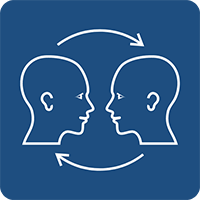
UK-wide Policy
Policy and influencing at the RCSLT
Policy and Influencing across the UK covers topics that affect speech and language therapy across every area of the country.
To find out more about our work across the country and it’s impact , visit our page on policy and influencing
Read about the impact that the PPA team has made over the past few years:
- Policy and Public Affairs Impact report_2023-2024 (PDF)
- PPA team Impact Report 2021/22 (PDF)
- PPA team Impact Report 2020/21 (PDF)
View the results from our latest vacancy and recruitment survey, conducted to identify trends and issues with recruitment in the speech and language therapy profession.
Promoting and implementing inclusive communication
Because people communicate in a variety of different ways, it is imperative that the lived environment supports this. By adopting inclusive communication, societies can show how they value, respect and include people with communication support needs.
Our aim is to highlight:
- What RCSLT means by inclusive communication and why its implementation is vital.
- Professional, regulatory, legal and human rights reasons why you have a responsibility, wherever you work, to promote and support the implementation of inclusive communication at individual, service and population levels.
- Evidence and resources you can use in collaboration with others to make sure inclusive communication is put into practise.
Read more about inclusive communication
Other relevant sections on RCSLT website
See also the RCSLT Policy Twitter handle @rcsltpolicy.
Inclusive communication for all

Communication disabilities affect millions of people. Up to 14 million people in the UK (20% of the population) will experience communication difficulties at some point in their lives, with more than 10% of children having a long-term communication need.
Communication Access UK is an initiative, developed in partnership with charities and organisations, that shares a vision to improve the lives of people with communication difficulties.
Led by the RCSLT, the partnership includes:
- Stroke Association
- Headway
- MND Association
- Disability Rights UK
- Business Disability Forum
- Communication Matters
- The Makaton Charity
- National Network of Parent Carer Forums
Together, we’ve developed the Communication Access Symbol; a new disability access symbol underpinned by a completely free training package and standards. We hope that these will help you, and your businesses or organisations, to better support people with communication difficulties.
The impact of communication disability
Communication does not simply concern the ability to speak but, also, the ability to hear and understand what is being said.
The impact of communication difficulties and disabilities is varied; some people may find it hard to ask a question, name an object or ask for help, while others may have speech difficulties that make them difficult to understand.
Other people may have problems processing information, as well as difficulties with reading and writing. Some may use communication devices and require time to create their message.
Communication disabilities leave millions without a voice, denying them equality of access and opportunity.
A symbol for equality
The Communication Access Symbol has been developed to identify businesses and organisations whose staff have undergone training to help them to better support the needs of people with communication difficulties.
Businesses and organisations whose staff have taken the training will be accredited as communication accessible and will be permitted to display the Communication Access Symbol.
Anyone can sign up to Communication Access UK and complete the free training, from corporate businesses and large organisations to local shops and individuals.
How to get involved
To learn more about the initiative, or to sign up, visit the Communication Access UK website.
The partnership
The Communication Access UK steering group is chaired by the Royal College of Speech and Language Therapists and comprises the RCSLT and the following charities and organisations:

Spending Review – June 2025
On 11 June, the Chancellor of the Exchequer, Rachel Reeves, delivered her Spending Review. This has important implications for speech and language therapists and for people accessing speech and language therapy. That is because communication – and safe eating, drinking, and swallowing – is central to the delivery of some of the Review’s sections – including strong foundations, an NHS fit for the future, opportunity for all and safer streets, and growth.
What is relevant to speech and language therapy?
Relevant proposals in the Review include:
- NHS funding – on average, across the Spending Review period (from 2023-24 to 2028-29), the NHS in England will receive 3.0% real terms growth in day-to-day spending
- Reforming children’s social care – including plans to refurbish and expand children’s homes and foster care placements
- Reforming special educational needs and disabilities (SEND) – including a Schools White Paper in the autumn, which will include details of the Government’s intended approach to SEND reform
- A Transformation Fund – designed to support reform of public services so that they are focused on prevention, and the development of innovative approaches to support vulnerable cohorts
- Preventing homelessness – including through investing in early intervention measures
- Mental health and family help – including the planned expansion of mental health support teams to 100% of schools in England by 2029-30 and the Families First Partnership programme, which is designed to giving families and children access to better local support services to break the cycle of late intervention and help more children and families to stay safely together.
What does the RCSLT think?
The RCSLT welcomes anything that improves the lives of people with communication disability, difficulty, or difference, and/or those who have eating, drinking, and swallowing difficulties. We hope that the Spending Review will help to deliver that, including by addressing the issues identified in the Invest in SLT briefing for the debate on Mikey Akers’ Invest in SLT petition. On that, we look forward to the Government’s Action Plan on tackling the issues Mikey’s petition covered.
Specifically on SEND, we welcome the significant amount of investment committed to reforming the system (£547m in 2026/27 and £213m in 2027/28). On the Government’s approach to SEND, any reform, including any legislative change, should take the opportunity to improve accountability and consolidate best practice: joint commissioning and pooled budgets between the NHS and local government, guaranteed support for the local offer, and learning from government supported developments such as Early Language Support for Every Child (ELSEC). They must also engage meaningfully with the professionals, and children and families, who will be impacted by any changes.


